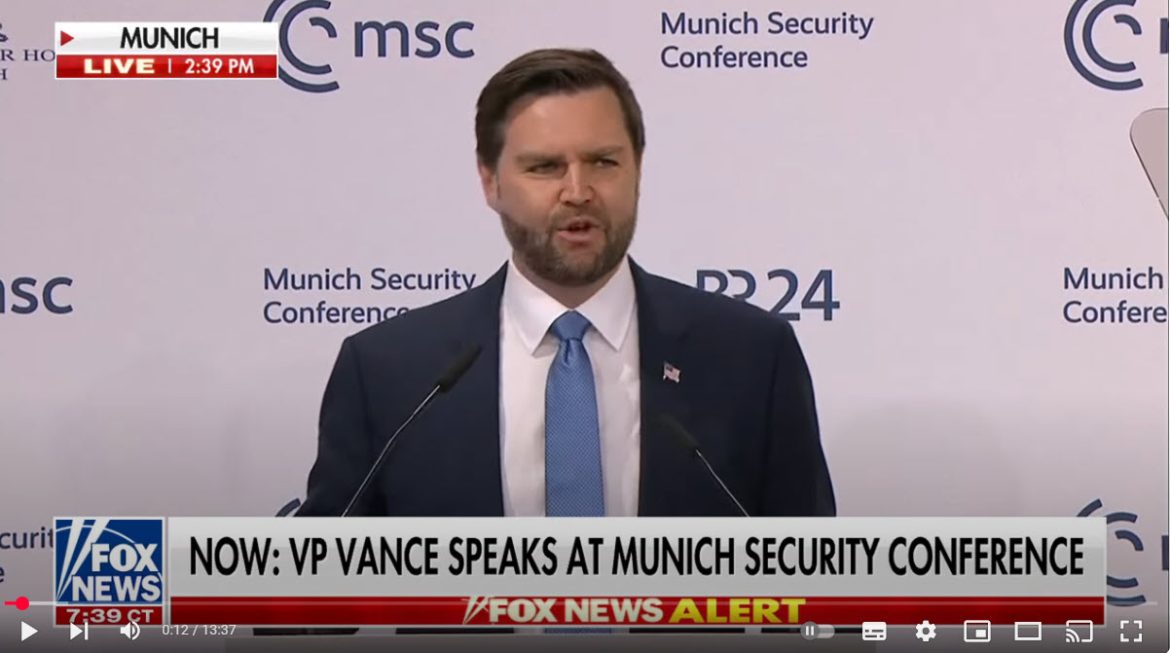At the Munich Security Conference on February 14, 2025, U.S. Vice President JD Vance delivers a provocative address, cautioning European leaders about internal threats to democracy, particularly focusing on censorship and mass migration. Vance emphasizes that these internal challenges pose a more significant danger to Europe than external adversaries like Russia or China.
In his 20-minute speech, Vance criticizes European governments for suppressing free speech and disregarding voter concerns on issues such as mass migration. He highlights instances where elections were canceled and political discourse was stifled, arguing that such actions undermine democratic values. Vance states, “The threat that I worry the most about vis-à-vis Europe is not Russia, it’s not China… What I worry about is the threat from within.”
Vance’s remarks draw immediate rebuke from European officials. German Defense Minister Boris Pistorius describes the comments as “not acceptable,” defending Europe’s commitment to democratic principles. Chancellor Olaf Scholz also criticizes Vance’s statements, emphasizing Germany’s historical reasons for maintaining a firm stance against far-right ideologies.
Adding to the controversy, Vance meets with Alice Weidel, leader of Germany’s far-right Alternative for Germany (AfD) party. This meeting signals a potential shift in U.S. engagement with European political factions traditionally ostracized by mainstream parties. German officials express concern over this interaction, viewing it as interference in domestic politics ahead of the upcoming federal elections.
On the topic of the Russia-Ukraine conflict, Vance’s speech offers limited insights into the U.S. strategy for resolving the ongoing war. However, he does meet with Ukrainian President Volodymyr Zelenskyy, who emphasizes the need for “security guarantees” before engaging in negotiations with Russia. This meeting underscores the complexities of achieving a unified approach to the conflict, especially amid mixed signals from the U.S. administration regarding potential negotiations with Russian President Vladimir Putin.
Vance’s address sparks a broader debate about the balance between national security and civil liberties in Europe. While some populist leaders praise his stance, mainstream European politicians caution against undermining established democratic norms. The discourse highlights the ongoing tension between preserving security and upholding the foundational values of free speech and open political discourse.
Sources:
- Vance Slams European Allies for Ignoring Voters, Suppressing Speech
- Vance to meet Zelenskyy as European leaders call for unity over Ukraine
- Zelenskyy to Vance: Ukraine wants ‘security guarantees’ as Trump seeks to end Ukraine-Russia war
- JD Vance says biggest danger in Europe is censorship during Munich address – not Russia or China: ‘Threat from within’
- US Vice President JD Vance meets German far-right leader as he criticizes ‘firewalls’ in Europe
- Vance attack on Europe overshadows Ukraine talks at security conference
- Vance draws German rebuff for seeing far-right AfD as potential partner
- At Munich conference, US VP Vance warns European allies of ‘threat from within’
- JD Vance stuns Munich conference with blistering attack on Europe’s leaders
- JD Vance goes after European allies in Munich Security Conference speech



